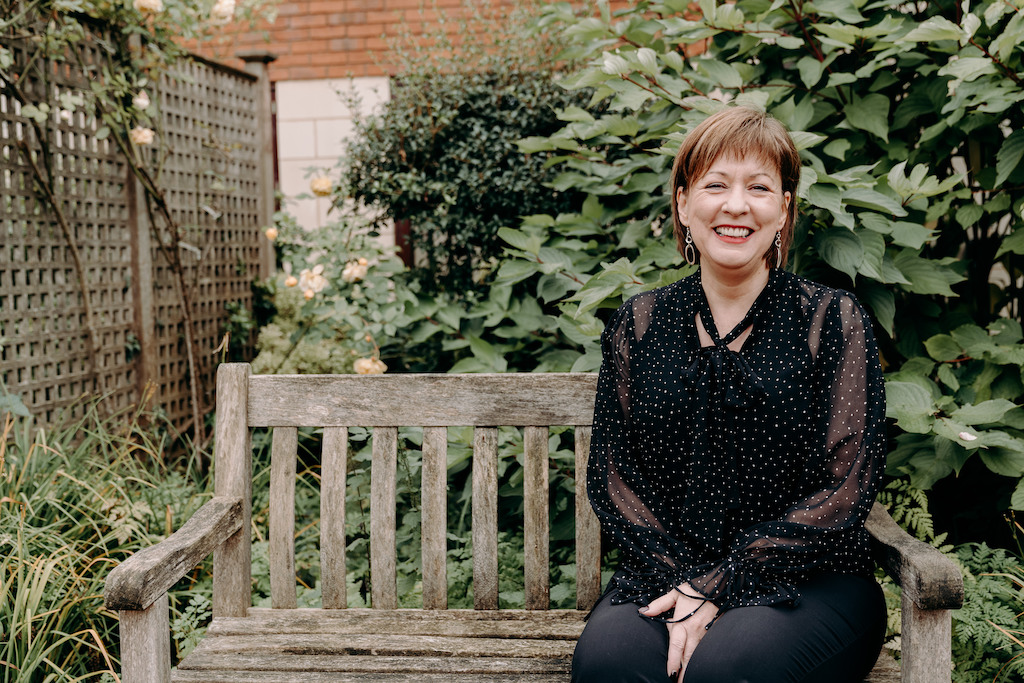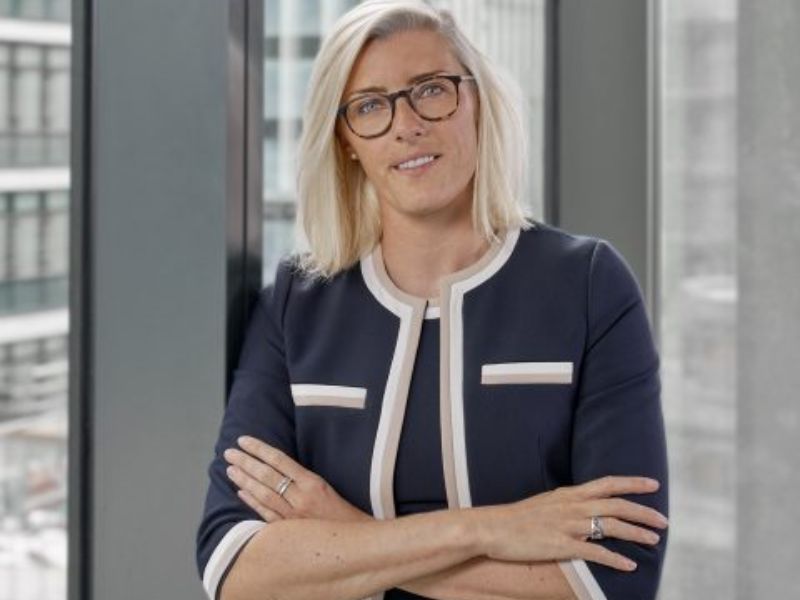Hello, my name is Barbara-Anne Walker, and I am the Chief Executive of Ashgate Hospicecare in Chesterfield.
As the Chief Executive at Ashgate Hospicecare, I am responsible for a workforce of 1,000, which includes 340 members of paid staff and over 600 volunteers.
Prior to Ashgate Hospicecare, I was an Operations Director with the British Red Cross whilst also working as a Non-Executive Director for Derbyshire Community Health Services NHS Trust. Previously, I worked for Macmillan Cancer Support as a Programme Manager and before that a number of local and national charities and third sector organisations.
In total, my career spans more than 30 years in the voluntary and public sectors throughout the UK.
I have a degree in Psychology from the University of Glasgow.
Did you ever sit down and plan your career?
No, not really. However, I knew that once I completed my degree that I wanted to work in the voluntary sector because I wanted to do something that would make a real difference. I was the first person in my family to attend university and I was very aware of how lucky I was, and I really wanted to be able to give some of that back.
It might sound strange from someone in my position, but I have never been particularly ambitious. I have, however, always sought a challenge and opportunities to learn and to be stretched which in turn has allowed me to further develop my skills and opened up opportunities.
Have you faced any challenges along the way?
Like lots of people, my greatest challenge, and an ongoing challenge, is the fear that I’m going to be found out – managing that imposter syndrome. It’s only in recent years that these feelings have been talked about more publicly and it has made a huge difference to realise that many people, in all sorts of senior roles, struggle with this same feeling.
Lots of men struggle with it, I know, but I do think it’s a much bigger challenge for women. Our society and our organisations are set up to systematically reward men for what are typically seen as ‘male’ traits –like ambition and assertiveness which, in turn, are often still seen as distasteful or inappropriate in women. By the same token, whilst empathy and inclusion are immensely powerful leadership strengths, they are deemed as weaknesses or with being ‘too feminine’.
We Are The City reported on research which showed that women admit to imposter syndrome far more than men do – and men report much higher levels of confidence.
I believe that there is strength in vulnerability, in being willing to be vulnerable as a leader.
The pandemic has pushed those feelings of inadequacy ever more to the surface and I’ve had many moments of self-doubt, but at the end of the day this is the job I signed up for and I knew I just had to get on with it.
Throughout my professional career I have come to realise that women – of all ages – will question whether they have a right to a seat at the table. I have been in meetings which are predominantly male attended and shared an opinion or suggestion that has been brushed to one side. Later, in that same meeting, a man has shared the same opinion and he’s been applauded. It’s absurd but it happens and continues to happen all the time.
It’s important to remember that women are an important and necessary part of the workforce; our opinions and our voices matter. Our skills and talents make organisations and businesses better and more successful. Even in my position I have moments where I feel the need to gear myself up before walking into a meeting, but it is important to take a breath and remember that I deserve to be there as much as anyone else.
As Susan Jeffers said: “Feel the fear and do it anyway”.
What has been your biggest achievement to date?
My biggest achievement to date is weathering the storm of COVID, adapting to the evolving challenges and safeguarding services and jobs, which had been put at risk due to the challenges caused by COVID.
COVID posed a threat to the health and wellbeing of the vulnerable patients in our care, but also to the charity’s finances which rely heavily on the goodwill of our local community.
Those first few months when COVID hit were really hard going as we navigated our way through a rapidly changing and unpredictable environment. Aside from the practical concerns which come from a large and disparate workforce, my biggest worry was keeping people safe and looking after their wellbeing.
Suddenly we were managing people under considerable strain, whether that was juggling work with homeschooling, supporting vulnerable family members or being cut off from their usual support networks.
I immediately began to look for ways that I could support our staff and volunteers and that is why we implemented a programme of wellbeing support early on.
There is no getting away from the stress and pressure that people are working under and that is why it is imperative that support is available as and when it is needed. At Ashgate, that support can take many different forms from confidential helplines and online support groups to regular team get togethers.
From the beginning of the pandemic, we opened the doors at Ashgate Hospicecare to end-of-life COVID patients, initially dedicating a separate wing on our 21-bedded inpatient unit, but then increasing this to two wings when demand doubled during the second wave.
Demand for our care and services had never been greater and as a result staff were redeployed from other areas of the hospice to bolster staffing levels on the inpatient unit. The move was part of a system wide response to support the NHS, increase admissions from the nearby Chesterfield Royal Hospital and free up hospital beds.
Like most charities, we soon began to feel the financial strain caused by COVID, as our shops closed, and our fundraising events were scaled back or cancelled. It looked like the charity was heading for compulsory redundancies and a reduction in our services.
Since the pandemic began, a total of £3m of income that we would normally budget for has been lost. The truth is that we had been suffering from chronic underfunding for years and the virus was the straw that broke the camel’s back.
I had been in discussions with our local NHS commissioners for many months and after countless meetings, support from our local community and too many sleepless nights we were finally able to come to an agreement which would safeguard vital end-of-life care and jobs.
Delivering this news to our staff and volunteers was such a relief as I knew how heart-breaking it would be if we had to close or reduce services, as well as the anxiety they were living with whilst their jobs were unsafe. I was acutely aware that this wasn’t just about business decisions, this was about the care we provide and about people’s livelihoods.
This is perhaps the largest hurdle I’ve ever had to overcome in my professional career, and although there were many moments which were daunting being at the centre of it, that kind of experience does provide you with the opportunity to grow as an individual and as a leader.
What one thing do you believe has been a major factor in you achieving success?
Other women and being fortunate enough to work alongside them. I have been lucky enough to witness strong, female leaders who have led by example.
I have seen how compassionate leadership built on a framework of strong relationships can work effectively. I have seen how this leadership style continually delivers results, how it motivates the workforce and how it triumphs during a crisis.
I also believe that success is based on a commitment to continually learn and evolve. Leadership is a skill in its own right; good leadership doesn’t just happen, you have to work at it. If I am not intentional about developing and putting my leadership into action, it won’t happen.
How do you feel about mentoring? Have you mentored anyone or are you someone’s mentee?
I think mentoring is incredibly powerful and cannot be underestimated, especially women supporting women and being able to share our knowledge and impart our wisdom. Nothing is more empowering than lifting another woman and helping her to realise her full potential.
I am lucky enough to have the opportunity to mentor another woman at the moment. We meet monthly and we explore what she is trying to achieve and the challenges she has faced. We share perspectives on the situation and together we work out ways for her to move forward and achieve her objectives.
I also have regular mentoring sessions myself which are vital to my work. They afford me the space to think about what I am doing and why, and what my leadership needs to be moving into the future.
If you could change one thing to accelerate the pace of change for Gender Equality, what would it be?
I’d like to see more businesses and organisations commit to addressing the inequalities that exist in the workplace and putting more women in senior positions, as only then will we have the power to change the inequalities that still exist.
And as a straight, white, cis, able-bodied woman, this is about supporting lesbian and bi-sexual women, BAME women, transgender women and women with disabilities in leadership. They have been climbing an even steeper climb, and it is up to all of us collectively to ensure that change is implemented.
These conversations are starting to happen, but it is everyone’s responsibility to ensure that we all do more to readdress the balance and commit to an inclusive workplace.
We still have a way to go at Ashgate, but those conversations are happening right now, and I strongly believe that the more diverse voices you have in an organisation the better the organisation will be.
That includes women. We are an important part of the workforce; our opinions and our voices matter. Even in my position I have moments where I feel the need to gear myself up before walking into a meeting, but what is important to remember is that you deserve to be there.
Every day we are seeing exemplary female leaders who are leading from the front throughout this crisis. Nicola Sturgeon has shown great honesty with her decision making, as has Jacinda Ardern. Both are strong women, who are fantastic role models for women of all ages.
If you could give one piece of advice to your younger self what would it be?
Everybody is as scared and uncertain as you are, some of them just hide it better! I’d tell myself to remember that. But then to do it anyway!
What is your next challenge and what are you hoping to achieve in the future?
The next challenge is to create the path to what will become the future of Ashgate Hospicecare, with regards to our care and services and our workforce.
Will some of our services remain digital? What will our community need from us in the future and how will we flex and adapt to meet those needs? Will places of work be a hybrid of home and the office? These are just some of the questions that we will have to work through.
It’s challenging but also really important to be honest. I don’t really know what the future looks like, none of us do – but I do know that all of us at Ashgate Hospicecare are on a journey of transformation together and the pandemic has shown that to be more true than ever.
WeAreTheCity has a back catalogue of thousands of Inspirational Woman interviews, including Cherie Blair, Paula Radcliffe MBE, Caprice Bourret, Anna Williamson and many more. You can read about all our amazing women here.









